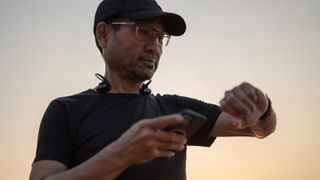Beware smartwatches that claim to monitor blood sugar without skin prick, FDA says
The Food and Drug Administration has warned consumers against using "smart" devices that are marketed to measure blood sugar without piercing the skin.

Smartwatches and "smart rings" are being marketed as being able to measure blood sugar without requiring a finger prick, but these devices are not authorized by the Food and Drug Administration (FDA) and should not be used, federal officials have warned.
People with diabetes must carefully monitor how their blood glucose levels fluctuate in response to medications, diet and exercise. Inaccurate measurements can lead people to take the wrong dose of insulin or other blood-sugar-lowering drugs, potentially leading to dangerous consequences, like seizures and coma.
Some smartwatch apps report blood sugar levels, but these apps are linked to FDA-authorized devices that do pierce the person's skin, such as continuous glucose monitors. Consumers should be wary of smartwatches that are marketed as monitoring blood sugar all on their own, the FDA cautioned in a statement released Feb. 21.
Related: What is normal blood sugar?
"The FDA has not authorized, cleared, or approved any smartwatch or smart ring that is intended to measure or estimate blood glucose values on its own," the statement reads. "Be aware that the safety and effectiveness of these devices have not been reviewed by FDA, and the use of these devices could result in inaccurate measurements of blood glucose levels."
The FDA's warning applies to any smartwatch or smart ring that claims to measure blood sugar without piercing the skin. The agency's warning didn't list any specific products but noted that such devices are made by dozens of companies and are sold under multiple brand names. They're often sold through online marketplaces or directly from their makers, the agency noted.
Related: Best fitness trackers 2024
Sign up for the Live Science daily newsletter now
Get the world’s most fascinating discoveries delivered straight to your inbox.
The FDA is now working to ensure that manufacturers, distributors and sellers don't illegally market these devices. In the meantime, the agency urges patients to discuss authorized blood sugar monitors with their medical providers.
"If your medical care depends on accurate blood glucose measurements, talk to your health care provider about an appropriate FDA-authorized device for your needs," officials said in the statement.
Anyone who experiences a problem with inaccurate blood glucose measurement or who experiences any adverse events from using an unauthorized smartwatch or smart ring can report the problem through the FDA's MedWatch Voluntary Reporting Form.
This article is for informational purposes only and is not meant to offer medical advice.
Ever wonder why some people build muscle more easily than others or why freckles come out in the sun? Send us your questions about how the human body works to community@livescience.com with the subject line "Health Desk Q," and you may see your question answered on the website!

Nicoletta Lanese is the health channel editor at Live Science and was previously a news editor and staff writer at the site. She holds a graduate certificate in science communication from UC Santa Cruz and degrees in neuroscience and dance from the University of Florida. Her work has appeared in The Scientist, Science News, the Mercury News, Mongabay and Stanford Medicine Magazine, among other outlets. Based in NYC, she also remains heavily involved in dance and performs in local choreographers' work.

Phaistos Disk: 3,000-year-old inscriptions from Crete that have never been deciphered

The biggest supermoon of the year is about to rise: When to see the 'Hunter's Moon' at its best and brightest

Bear hair and fish weirs: Meet the Indigenous people combining modern science with ancestral principles to protect the land